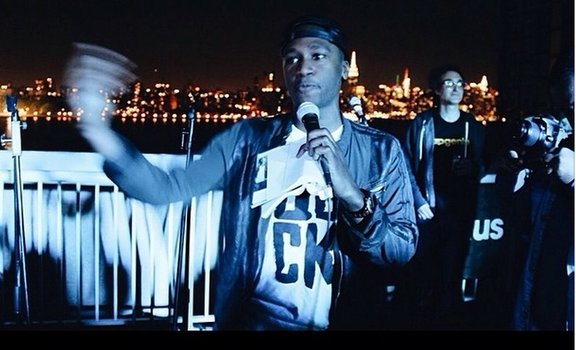MK Asante Carries Jay Z’s ‘Lit Hop’ Torch at Rap Genius Party
By Patrick Sauer

MK Asante in Brooklyn, May 13, 2014 © Ruben Rodriguez
“That story is still evolving – and my life is, too – so the way I tell it evolves and expands from album to album and song to song. But the story of the hustler was the story hip-hop was born to tell – not its only story, but the story that found its voice in the form and, in return, helped grow the form into an art.” –Jay Z, Decoded
Earlier this month, I witnessed something I never thought I’d see: a Brooklyn book party raided by the cops. More on that in a moment.
When then-hyphenated Jay Z’s Decoded came out in 2010, hip-hop reached a cultural level unforeseen by the guys who plugged their turntables into Bronx street lamps. It received a rave in The New York Times from Michiko Kakutani, led to one of the more entertaining episodes in Fresh Air’s storied history, and it re-contextualized one of rap’s greatest lyricists as a bookwormy literary figure. Part memoir, part street history, part fairy tale, Decoded turned Hova’s hip-hop canon into an art form all its own.
Jump ahead a few years to the Brooklyn offices of Rap Genius, where author MK Asante flipped Jay Z’s script, and a large group gathered to hear him read and rap at his paperback release and soundtrack listening party for his memoir, Buck. Rap Genius’s stated goal is to “annotate everything” – to be the online crowd-sourced version of Jay Z in Decoded for the genera and beyond. (It should be noted that Asante’s May 13 bash at Rap Genius headquarters took place prior to one of the site's founders getting fired over his heartless annotation of the Santa Barbara killer’s manifesto.) Buck served as blueprint for hip-hop songs featuring the convergence of Asante, Ras Kass, and Talib Kweli, among others. Like so many hip-hop classics, the lyrics are personal histories, slice-of-life autobiographies with a backbeat.
“So much of hip-hop is about the performer telling the story, or whatever version of it fits into song form, and that’s true of memoir as well. The most successful ones aren’t necessarily who has the best anecdotes, but the ones where the author shapes the material into an interesting narrative,” says Rap Genius executive editor Shawn Setaro. “Buck is a fantastic book, really powerful, vividly drawn. Meeting his brother Uzi at the event was like a movie character coming to life.”
Uzi spends a large part of Buck locked up, a cautionary tale for his younger brother “Malo,” who stepped back from the edge and took his rage to the page. The Rap Genius party was a lively affair where the booze was flowing and the music was bumping. Out on the terrace overlooking the East River, backdropped by the lights of the city, Uzi played the role of hypeman, extolling the crowd to Instagram the event while freestyling bits and pieces of their shared lives. It had all the makings of a wild block party – until the entire precinct showed up. Far be it for me to get all stop-and-frisky on New York’s Finest, but nearly a dozen cops on a noise complaint seems a tad excessive, no? Props to one of the hosts who didn’t even smirk when the officer said, “The name of the company is Rap ... Genius? And you have the entire floor?”
It was a night of celebration, so everyone took it in stride. The terrace was shut down, and the music was turned off, but the packed house wouldn’t go home disappointed. After apologizing that they wouldn’t get to hear more rhymes from Uzi, Asante debuted a new video and did a lively reading from Buck complete with a call-and-response usually heard at Sunday services. Asante grabbed the pulpit, and Rap Genius became his church.
“Buck felt immediate. It was told as-it-happened and not looking back, which pulled me into it. I loved Asante’s reading. It was perfect for our venue,” said Setaro. “He read Buck as if he was annotating it as he went along, stopping to comment on the excerpt, to add context, and to get Uzi to chime in on their childhood. It was Rap Genius come to life.”
The fluidity between the page, the mic, social media, and the performer impressed as a new way of telling one’s story that doesn’t begin and end in prose. Jay Z may have made the biggest splash in the “Lit Hop” genre, but I suspect you’ll be seeing a lot more crossing of cultural lines now that hip-hop has reached middle age. Like another legit author says, Can’t Stop, Won’t Stop.
I can’t wait to read, then hear, Asante’s retelling of the night the cops couldn’t shut him down. As Jay Z’s buddy Eddie Vedder would say, “It’s evolution, baby!”
